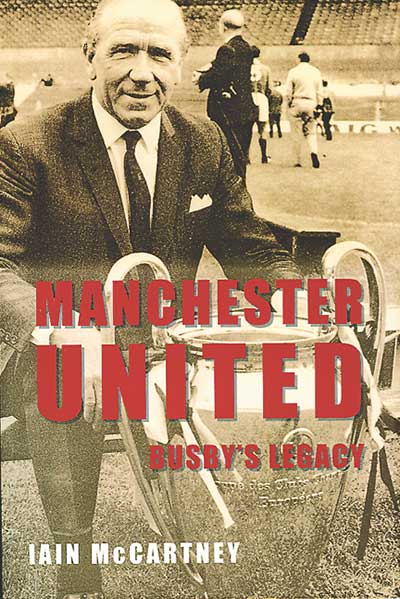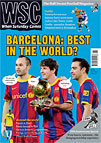 by Iain McCartney
by Iain McCartney
Amberley Publishing, £16.99
Reviewed by Charles Morris
From WSC 339 May 2015
A book about managerial succession and how a club attempts to replace an outstanding, long-serving supremo is timely, particularly in Manchester United’s case. Iain McCartney’s book follows his Rising from the Wreckage: Manchester United 1958-1968, which charted the club’s recovery from the Munich air tragedy to become the first English team to win the European Cup.
Rapid decline, however, is the theme of his sequel as he relates the club’s dismal failure to replace Matt Busby between 1968 and 1974 – when they were relegated from Division One – and to replenish the team of George Best, Denis Law and Bobby Charlton.
As a history of those six seasons it succeeds, but it seems a missed opportunity not to have broadened the format and considered other cases of managerial succession, particularly as United currently remain in a troubled transition from Alex Ferguson’s reign. Busby’s Legacy does, however, provide a case study in how not to handle such a handover. A tired Busby quit in 1969 after nearly 24 years that also included five domestic championships and two FA Cups. But he fatally remained as general manager and was allowed to choose his successor.
His choice of Wilf McGuinness proved disastrous – a history lesson ignored when Ferguson was allowed to select David Moyes. McGuinness, aged only 31, was Busby’s reserve team coach. He had no experience of managing a first team and was younger than some in an ageing United side, such as Charlton, Bill Foulkes and Shay Brennan. His authority was further undermined by initially being appointed only as “club coach” for an “unspecified probationary period”, and by the presence of Busby. The Scot kept the manager’s office while his successor was given a “corner cupboard”, and he later secretly tried to replace the hapless McGuinness with Celtic’s Jock Stein.
After McGuinness’s inevitable failure and removal in December 1970, Busby played a major part in the hiring of Frank O’Farrell from Leicester City. Although more experienced than his predecessor, O’Farrell’s record was “not trophy strewn”, including only one promotion with Torquay and an FA Cup runners-up and relegation with Leicester. Busby unsuccessfully tried the office belittlement trick on O’Farrell, too, and subsequently interfered in team matters.
One is tempted to conclude from these appointments that Busby, unconsciously, could not bear the idea of handing over to someone who might emulate his feats. After a disappointing 18 months O’Farrell was also sacked and replaced by Scottish national manager Tommy Docherty, who was unable to save the club from relegation before quickly restoring their fortunes back in Division One.
McCartney’s tale of a great team in decline for the most part rattles along, reminding us vividly of Best’s genius and his sad early fall into alcoholism, the complacency and ineptitude of United’s directors and the onset of two decades of appalling football hooliganism. It suffers, however, from an over-reliance on match reports, sticking only to the historic facts and dreadful editing. The book is littered with spelling errors and misused words, all of which are irritating and only one amusing: where the team’s performance is said to be “bisected with a fine toothcomb”. Readers paying £16.99 deserve better.


